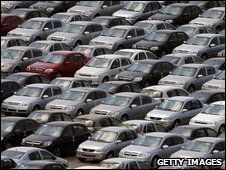
The European Commission has called for a crisis meeting among EU states hosting General Motors (GM) plants.
EU Industry Commissioner Guenter Verheugen said that the way GM was "dealing with the issue of Europe is not acceptable".
Earlier, the troubled carmaker's auditors said there was "substantial doubt" about the ability of General Motors to stay afloat.
Last week GM posted a $30.9bn (£21.9bn) loss for 2008.
It also warned that 2009 was set to be "challenging".
Shares in General Motors fell more than 15% in New York trading.
European worries
Earlier this week, GM's top executive warned the European divisions of General Motors (GM) could collapse within weeks without European governments' help - costing up to 300,000 jobs.
Chief operating officer Fritz Henderson also said governments should step in immediately to ensure GM Europe did not run out of money by April or May.
Mr Verheugen said: "We expect GM to disclose everything,
"What are their plans with their European daughter companies and locations? What are they doing with property rights, and especially is GM prepared to maintain responsibility for the European companies or not?"
He said that at the emergency meeting he wanted to find out "what the different member states that have GM sites are considering to do".
EU countries that have GM-related production plants include Britain, Belgium, Poland, Germany, Spain and Sweden. Some other EU states host suppliers.
Liquidation fear
Ongoing losses and the struggle to generate cash flow meant the firm's ability to continue as a going concern should be questioned, said the auditors.
The firm, which plans to cut 47,000 jobs, has said it might need another $22.6bn in government loans to survive.
It had already received $13.4bn in federal loans as it struggles in what analysts say is the worst vehicle sales market in 27 years.
GM said that its creditors had decided not to force the company to repay more than $6bn in loans following the auditor's warning, in order to let GM press the case for more government financial aid.
"The corporation's recurring losses from operations, stockholders' deficit, and inability to generate sufficient cash flow to meet its obligations and sustain its operations raise substantial doubt about its ability to continue as a going concern," auditors for Deloitte & Touche wrote in the annual report.
GM reiterated on Thursday that a bankruptcy filing could lead to liquidation, as the company would not have enough funds to finance its reorganisation.
Besides, consumers could be reluctant to buy bankrupt carmakers' vehicles, GM said.
According to GM, its February sales plummeted 53% from a year earlier, while its rival Ford posted a 48% drop.
The auditors' remarks reflect comments already made by the firm about its difficulties.
GM said in its annual report: "Our future is dependent on our ability to execute our viability plan.
"If we fail to do so for any reason, we would not be able to continue as a going concern and could potentially be forced to seek relief through a filing under the US bankruptcy code."






































